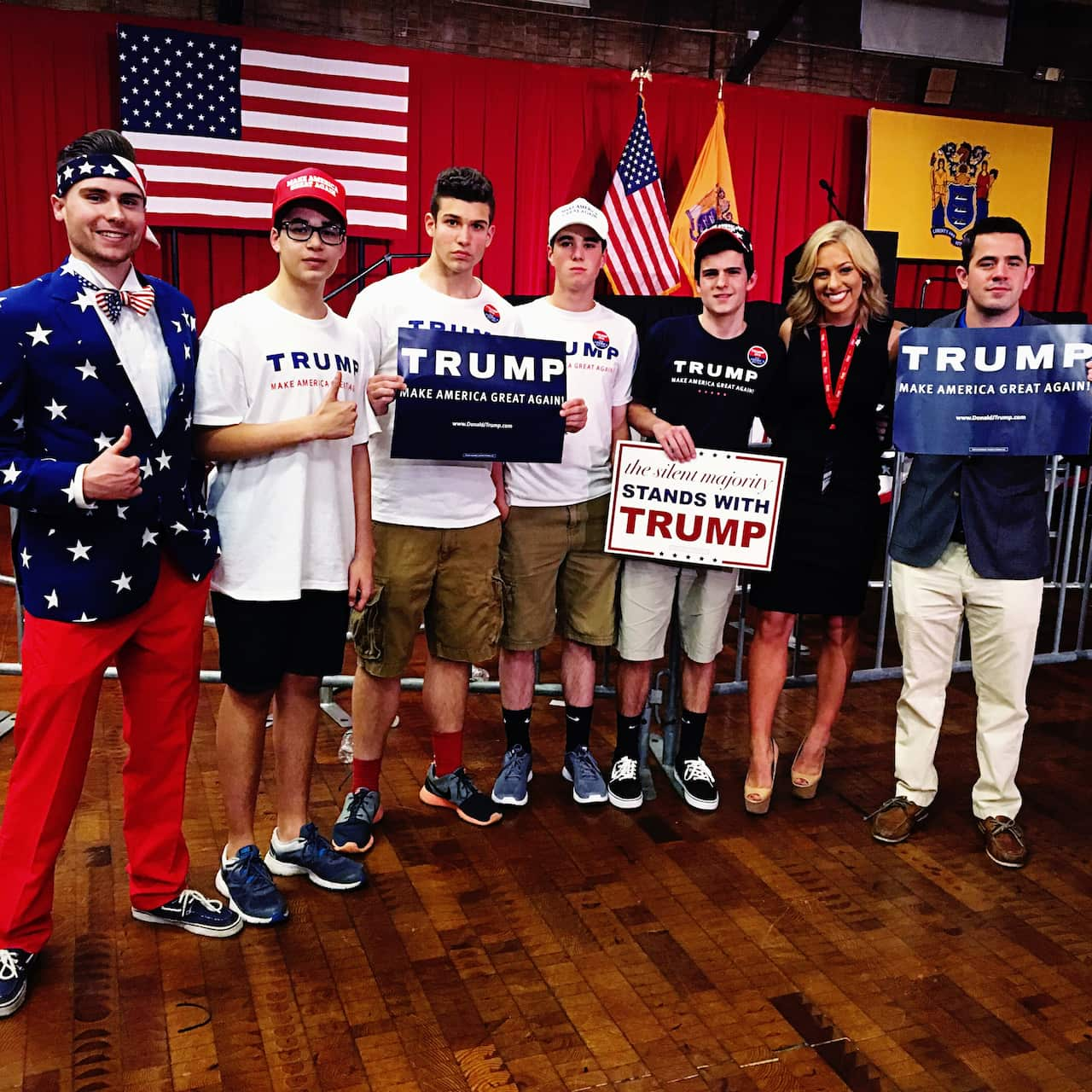When Sarah Hagmayer arrived in New York City on a recent visit, the 21-year-old couldn’t help but feel dispirited. For all Manhattan’s charms, a major drawcard was missing.
“I was so upset because Donald Trump and his family were in Raleigh, North Carolina,” says Hagmayer, who grew up in New Jersey and studies business at a community college.
She’s a big fan of the Republican Party’s 2016 candidate for President, and started volunteering with Students for Trump after seeing their material on social media. Old enough to vote for the first time, she found the other Republican contenders' over-rehearsed talking points grating.
“That's why everyone started liking Trump," she says. "Regardless of what he was saying, he was saying it.”

Sarah Hagmayer (right) poses with the owner of an infamous pro-trump truck sign, and her sister, Samantha (left), in Pennsylvania. Source: Supplied
It’s all part of a simple but improbable goal: Students for Trump want to make under-30s Republican again.
Despite being an election that’s breaking all the rules, 2016 has so far conformed to one worrying trend for America’s major conservative party. Since 2004, younger voters have overwhelmingly sided with the Democratic Presidential candidate. And beyond the buzzing true believers, Trump has struggled to endear himself to young American voters – inside and outside of the Republican Party.
In a , Clinton leads Trump by 21 points among 18- to 34-year-olds, a blow-out when you consider the Democratic nominee leads by just five points among all age groups. It might seem common sense that progressives perform better among this cohort, but it’s not always the case. In the absurdly close election of 2000, among 18- to 24-year-olds (thanks, in part, to the presence of a progressive third party option).
Tellingly, the 70-year-old Trump is also less popular among young Republicans than old. from 21 states during the Republican primaries found his vote was lower among under-30s in every state bar one. Trump won the overall vote in 17 of those states, but won the youth vote in just 11.
Concerned during the primaries, some young members of his party have since been driven to despair, outraged by his and .
Michael Fitzgerald, who served as the Yale College Republican’s Treasurer before Trump’s candidacy, has concerns.
“[Trump’s proposed] ban on Muslims coming into the United States, I think that's problematic and doesn’t represent true American conservative values,” he says. “I'd say my issues are definitely with him as a person – or at least the person he now presents himself to be – but they're also policy disagreements I have with him.”

Sarah Hagmayer meets Eric Trump. Source: Supplied
On August 4, the Harvard Republican club that for the first time since 1888 it would not back the party’s nominee for President. In an evisceration of Trump garnering more than 125,000 shares and spawning a still burgeoning thread of over 16,000 comments, the club labelled Trump’s comments racist, dubbed him “absurdly cruel”, and argued that “his authoritarian tendencies and flirtations with fascism are unparalleled in the history of our democracy”.
A number of other colleges soon followed suit.
Michael Fitzgerald’s Yale College Republicans club split in two. The club had initially agreed to keep quiet on the Trump question, but after a Twitter account impersonating the group started bagging him online its co-Presidents released a statement backing the nominee, causing the anti-Trump members to quit and form the Yale New Republicans club in protest.
"If somebody calls them a racist, they don't care. If somebody tries to use nationalist as a dirty word, they don't care.”
The University of Connecticut Republicans “mentally unstable” while Pennsylvania State University Republicans . College Republicans at the University of Virginia were divided almost perfectly down the middle when they voted on whether to endorse Trump in a debate that included an impassioned appeal from one anti-Trump student whose parents had migrated to the US illegally (the Trump supporters won the vote). Other campuses have endorsed Libertarian Party candidate Gary Johnson.
“That has been something that we have had to deal with as College Republicans nationally,” says James Allsup, a third-year student at Washington State University, and Chair of the state’s Republican College Federation.
Allsup is the National Field Director for Students for Trump, and sees the candidate as part of an international groundswell against “globalism” demonstrated abroad by Brexit and the growth of other nationalist, anti-immigration parties in Europe. He wants to see the Republican Party go the same way.
"I think you've seen a lot of people who are in my kind of age range, 16-year-old to 26-year-old men, going online, doing more research, and reading about these issues,” Allsup says.
“They're not afraid of labels as much as people of generations past are. If somebody calls them a racist, they don't care. If somebody tries to use nationalist as a dirty word, they don't care.”
Like , Allsup sees the divide in Republican ranks as a potential ideological turning point.
“I think there is a real conversation that has to be had among people who are in the Republican Party about which direction they want to go: If they want to become a nationalist workers’ party, or do they want to continue down the current path,” he says.
Realising the awkward historical connotations of the phrase ‘nationalist workers’ parties’ Allsup quickly clarifies, saying he wants a party that stands with Trump on economics and puts “blue collar workers” first.

Sarah Hagmayer (second from right) with students at a small Trump event in Lawrenceville, NJ. Source: Supplied
The Institute’s recent work indicates Trump’s message is finding an enthusiastic reception among a small number of young voters but failing to win over significant levels of overall support.
Millennials are in the United States. They’re also the most racially , according to the Pew Research Centre, and have spurned party labels despite showing liberal policy inclinations and Democratic tendencies. A July survey found around .
“What we’ve seen is that Trump has underperformed where, traditionally, a Republican would expect to be in 2016 against Hillary Clinton,” Volpe says.
The good news for Students for Trump is the bad news for the Democrats. While Bernie Sanders is wildly popular with millennials – as is President Barack Obama – Hillary Clinton has failed to excite them in the same way. Her campaign acknowledged as much this week, releasing , while for a boost.
Their party might be fractured at all levels, but the antipathy towards Clinton has left Trump’s young supporters confident.
During her visit to New York City, Sarah Hagmayer made a chance encounter outside the Fox News studios. Donald was out of town but, as fate would have it, his second son Eric was leaving just as she arrived. They chatted for ten minutes about Students for Trump – “they know what we're doing, they know how many students we're getting involved, and they love it" – as Hagmayer’s heart raced with excitement.
“Who happens to run into members of the Trump family like that,” she asks rhetorically. “It just doesn’t happen!”
In the year of the Trump candidacy, the future looks harder to read than ever. They may be doing it without their peers, but Trump’s young supporters believe their bombastic hero could still deliver his biggest shock yet.

